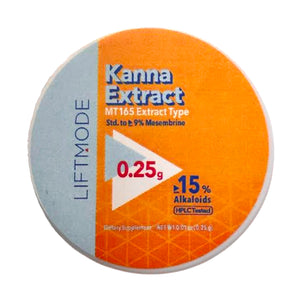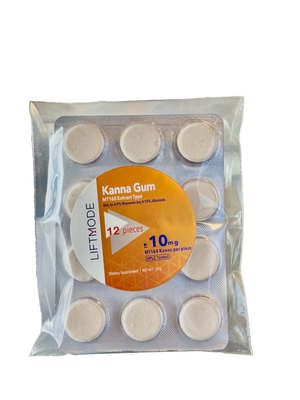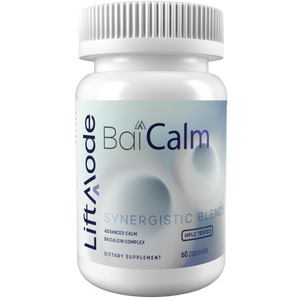Many people are searching online for a possible L-Theanine anxiety connection. This is clearly because of L-Theanine’s well-documented abilities to help improve sleep and mood, as well as to produce a relaxed and calm state of mind. All of these attributes are negatively affected by a high-stress lifestyle, and that’s where L-Theanine can come in handy.
In this article, we explore the
benefits of L-Theanine for promoting relaxation, reducing stress, and improving mood. We also look into the synergistic relationship between
L-Theanine and caffeine. Lastly, we explore if there is any documented connection between L-Theanine and anxiety.
[caption id=""attachment_2226"" align=""aligncenter"" width=""848""]
![]()
L-Theanine is known to be a powerful relaxing supplement with great mood boosting properties[/caption]
1. L-Theanine and Relaxation
Numerous studies have examined the effects of
L-Theanine supplements on people’s state of mind. Researchers have found that L-Theanine has a powerful relaxing effect on most people. Studies have compared L-Theanine supplements to some commonly prescribed relaxing agents and found that L-Theanine may be more effective and promoting a relaxed state.
[1]
Furthermore, researchers in Korea have found that L-Theanine supplements alter your brain waves. After taking L-Theanine tablets, participants in a 2003 study were seen to have increased alpha brain wave activity – especially those with high baseline anxiety.
[2] Alpha brain waves are associated with increased creativity, relaxation, and improved mood.
[3]
L-Theanine is known to promote relaxation through its effects on receptors in your brain. Specifically, L-Theanine activates the GABA receptors. GABA receptors are involved in a number of functions in your body, and are best known as the
relaxing receptors. Substances that activate GABA receptors are referred to as
depressants – not because they make you feel depressed, but because they depress signals from your Central Nervous System.
[4]
The effect is actually quite the opposite of making you feel depressed. In fact, the majority of chemical agents that are used to treat anxiety or depression have some kind of action on GABA receptors. Alcohol and benzodiazepines are also considered to be depressants.
L-Theanine can, therefore, be considered as a
depressant supplement – one that helps to reduce signals from the Central Nervous System and promotes relaxation.
[5] This has been known to humans for thousands of years. In the East, tea is used as a relaxing drink with health benefits. What is the greatest natural source of L-Theanine? Green tea!
[6]
2. L-Theanine and Mood
[caption id=""attachment_1991"" align=""alignright"" width=""298""]
![]()
Liftmode's L-Theanine, 99% Purity 5 Grams[/caption]
Many people think of L-Theanine as a great supplement to improve mood. L-Theanine is known to activate GABA receptors and promote relaxation, but its effects on mood are not quite as well understood. People who suffer from anxiety often experience low moods as a result of their consistent worrying. As a result, many people are searching for the L-Theanine anxiety connection. Unfortunately, there have not yet been any conclusive studies on the direct link between L-Theanine and mood.
One important thing to consider is that scientists have found solid evidence of L-Theanine’s remarkable ability to reduce stress. Stress is an important aspect of a bad mood. Studies have consistently linked stress to a low mood. Since stress is such an important feature of our daily lives, managing it is key to maintaining a healthy mood.
[7]
Also, scientists have found that
L-Theanine is able to help improve sleep quality. Again, a lack of good, healthy sleep has been linked to low moods. Insomnia and
hypersomnia (too much sleep) are associated with a higher risk of developing mood disorders.
[8] In a 2011 study, scientists demonstrated that 400 mg of L-Theanine before bed dramatically improved sleep quality for children.
[9]
Lastly, as we mentioned above, researchers have linked L-Theanine supplements to an increased activity of alpha brain waves. Even at low dosages of around 50mg, L-Theanine exerts an effect on your brain that increases the alpha brain waves.
[10] Alpha brain waves are associated with a relaxed and alert state of mind. Alpha brain waves are also prominent during periods of meditation and are highly prevalent in EEG scans of deep meditators. These data indicate that alpha brain waves are linked to improved mood.
[11]
[caption id=""attachment_2227"" align=""aligncenter"" width=""844""]
![]()
Scientists have found that L-Theanine is an effective supplement for improving your mood[/caption]
3. L-Theanine and Caffeine
One of the most important benefits of L-Theanine is its synergistic relationship with caffeine. Multiple studies have shown that L-Theanine and caffeine work well together to boost mental alertness and focus. Importantly, L-Theanine is able to reduce many of the negative effects associated with caffeine.
[12]
On the one hand, scientists have found that caffeine is associated with increased feelings of anxiety and jitteriness. This is especially relevant for people with anxiety disorders – data shows that the negative effects of caffeine are more pronounced in people who suffer from anxiety.
[13]
On the other hand,
L-Theanine and caffeine have been showed to have a good synergistic relationship. For example, L-Theanine and caffeine can help to improve alertness and boost mental performance.
[14]
A 2008 study from the Journal of Biological Psychology showed that L-Theanine and caffeine have improved effects when taken in combination. The combination of the two substances improves reaction time, working memory time, and sentence verification accuracy. Not only this, but the combination of L-Theanine and caffeine promote a reduction in headaches and tiredness when compared to either of the supplements taken alone.
[15]
It’s no wonder that people are searching for the L-Theanine anxiety connection online. Since L-Theanine and caffeine are the two key active ingredients in tea, it’s useful to understand their relationship. For more information about caffeine and anxiety, take a read through our <informative article here>.
4. L-Theanine and Anxiety?
[caption id=""attachment_2229"" align=""alignright"" width=""266""]
![]()
L-Theanine helps promote alpha brain waves which are seen during meditation[/caption]
Although many people online are searching for a possible L-Theanine anxiety connection, no conclusive research has yet been produced showing that L-Theanine can alter symptoms of anxiety.
One study from 2011, published in the Journal of Clinical Psychiatry, indicated possible anxiolytic effects of L-Theanine in patients with schizophrenia. L-Theanine supplements were shown to improve mood and reduce stress to a statistically significant extent. The patients were given 400mg of L-Theanine daily for 8 weeks.
[16]
In 2007, scientists published a study showing a possible L-Theanine anxiety connection in experimental sessions. Participants in the study were given a complicated mathematics task as a stress-inducer. They were either given placebo or L-theanine in a controlled, double-blind experiment. The results showed that L-Theanine significantly reduced stress response markers like heart rate and immunoglobulin A (s-IgA) levels.
[17]
Despite some interesting studies showing a possible connection between L-Theanine and anxiety, there have also been studies showing indicating no interaction. One such study was published in the Journal of Functional Foods in 2011. The aim of the study was to examine the effects of a 200mg dose of L-Theanine on reaction time. Although the results showed a positive effect on mental awareness and focus, there appeared to be no significant effect on stress.
[18]
A recent literature review showed that there have been conflicting data in studies examining the possibility of an
L-Theanine anxiety connection. A search on the publicly accessible database for clinical trials, PubMed, found seven relevant studies to examine this possible connection. The studies had small participant sizes, and were often not of sufficient quality to produce relevant results. So, the question of an L-Theanine anxiety connection remains a mystery for scientists to resolve.
[19]
[caption id=""attachment_2228"" align=""alignright"" width=""848""]
![]()
Research has shown that L-Theanine, the active ingredient in tea, helps reduce stress[/caption]
Conclusion
In summary,
L-Theanine is a powerful supplement to help promote a calm, relaxed state of mind. Studies have shown that L-Theanine affects GABA receptors and promotes relaxation. Research has also pointed to L-Theanine’s ability to improve sleep quality and to reduce feelings of stress. While these are all symptoms of interest to people who are interested in an L-Theanine anxiety connection, they do not necessarily show that L-Theanine has any relevant anxiolytic effects.
L-Theanine has a synergistic relationship with caffeine. When taken together, the two supplements help to improve mental alertness and focus. L-Theanine is also able to help reduce some of the negative effects of caffeine like headaches and elevated blood pressure.
Research into the relationship between L-Theanine and anxiety has produced conflicting results. In the past, people used L-Theanine as a powerful supplement to reduce feelings of stress. Today, L-Theanine can be purchased as a dietary supplement to promote relaxation, healthy sleep, a calm mood, and as a synergist for caffeine.
***
Disclaimer: L-Theanine is a dietary supplement and is intended to be used in addition to healthy diet and lifestyle. It is not sold to treat, cure, or diagnose any disease or ailment.
Medical Disclaimer
Not intended to treat, diagnose, or cure any disease or ailment. Please read and fully understand potential adverse effects before using this product. These statements have not been reviewed by the FDA and are not written by a medical professional. Please consult your doctor before using any supplements, especially if you have any medical conditions. Tristan
B.Sc. in Molecular Biology and Biochemistry Researched & written by
Tristan and verified by the Liftmode.com Research Team
References:
[1] Lu, Kristy, Gray et al., “
The acute effects of L-theanine in comparison with alprazolam on anticipatory anxiety in humans”, Human Psychopharmacology, 19 7: 457-465.
[2] CH Song et al., “
Effects of Theanine on the Release of Brain Alpha Wave in Adult Males”, Korean J Nutr. 2003 Nov;36(9):918-923. Korean.
[3] W Klimesch, “
Alpha-band oscillations, attention, and controlled access to stored information”, Trends Cogn Sci. 2012 Dec; 16(12): 606–617.
[4] AM Abdou et al., “
Relaxation and immunity enhancement effects of gamma-aminobutyric acid (GABA) administration in humans”, Biofactors. 2006;26(3):201-8.
[5] Kimura R, Murata T, “
Influence of alkylamides of glutamic acid and related compounds on the central nervous system. I. Central depressant effect of theanine”, Chem Pharm Bull (Tokyo). 1971 Jun;19(6):1257-61.
[6] “
L-Theanine”, PubChem, Open Chemistry Database, CID 439378, accessed May 16, 2017
[7] K Kimura et al., “
L-Theanine reduces psychological and physiological stress responses”, Biol Psychol. 2007 Jan;74(1):39-45. Epub 2006 Aug 22.
[8] MJ Peterson, RM Benca “
Sleep in mood disorders”, Psychiatr Clin North Am. 2006 Dec;29(4):1009-32
[9] MR Lyon et al., “
The effects of L-theanine (Suntheanine®) on objective sleep quality in boys with attention deficit hyperactivity disorder (ADHD): a randomized, double-blind, placebo-controlled clinical trial”, Altern Med Rev. 2011 Dec;16(4):348-54.
[10] AC Nobre et al., “
L-theanine, a natural constituent in tea, and its effect on mental state”, Asia Pac J Clin Nutr. 2008;17 Suppl 1:167-8.
[11] C Bergland, “
Alpha Brain Waves Boost Creativity and Reduce Depression”, Psychology Today online, accessed May 16, 2017
[12] PJ Rogers et al., “
Time for tea: mood, blood pressure and cognitive performance effects of caffeine and theanine administered alone and together”, Psychopharmacology (Berl). 2008 Jan;195(4):569-77. Epub 2007 Sep 23.
[13] DR Lara, “
Caffeine, mental health, and psychiatric disorders”, J Alzheimers Dis. 2010;20 Suppl 1:S239-48.
[14] T Giesbrecht et al., “
The combination of L-theanine and caffeine improves cognitive performance and increases subjective alertness”, Nutr Neurosci. 2010 Dec;13(6):283-90.
[15] CF Haskell et al., “
The effects of L-theanine, caffeine and their combination on cognition and mood”, Biol Psychol. 2008 Feb;77(2):113-22. Epub 2007 Sep 26.
[16] MS Ritsner et al., “
L-theanine relieves positive, activation, and anxiety symptoms in patients with schizophrenia and schizoaffective disorder: an 8-week, randomized, double-blind, placebo-controlled, 2-center study”, J Clin Psychiatry. 2011 Jan;72(1):34-42
[17] K Kimura et al., “
L-Theanine reduces psychological and physiological stress responses”, Biol Psychol. 2007 Jan;74(1):39-45. Epub 2006 Aug 22.
[18] A Higashiyama et al., “
Effects of l-theanine on attention and reaction time response”, Journal of Functional Foods, Volume 3, Issue 3, July 2011, Pages 171–178
[19] C Gilbert, “
The Effect of Tea and Its Constituent L-Theanine on Anxiety: A Review of the Literature”, Food Science and Nutrition Department, California Polytechnic State University, Dec 2014




